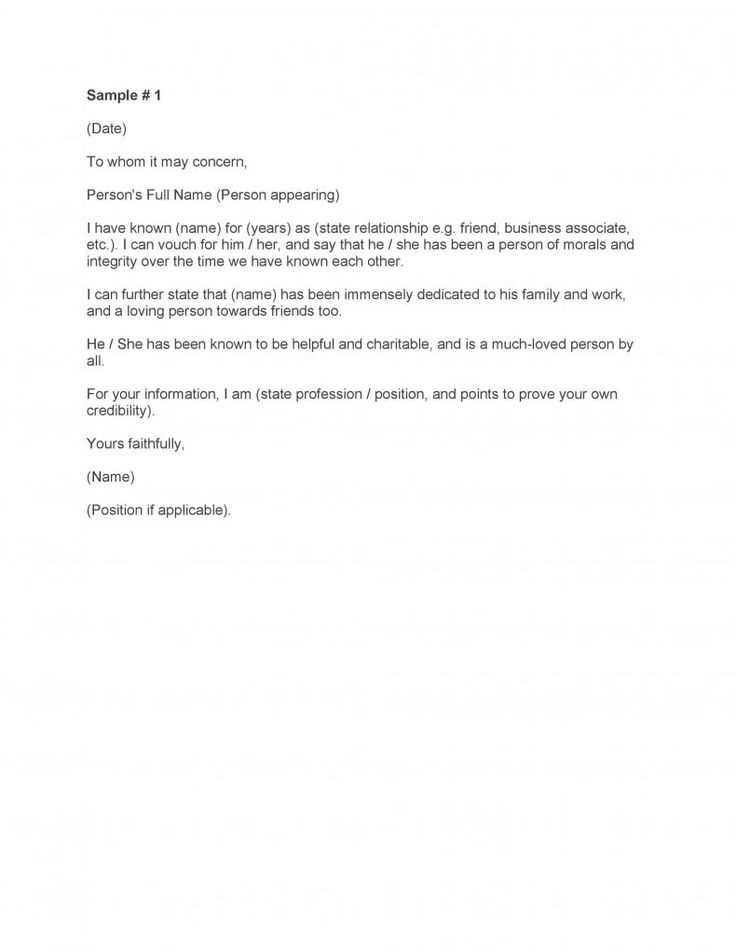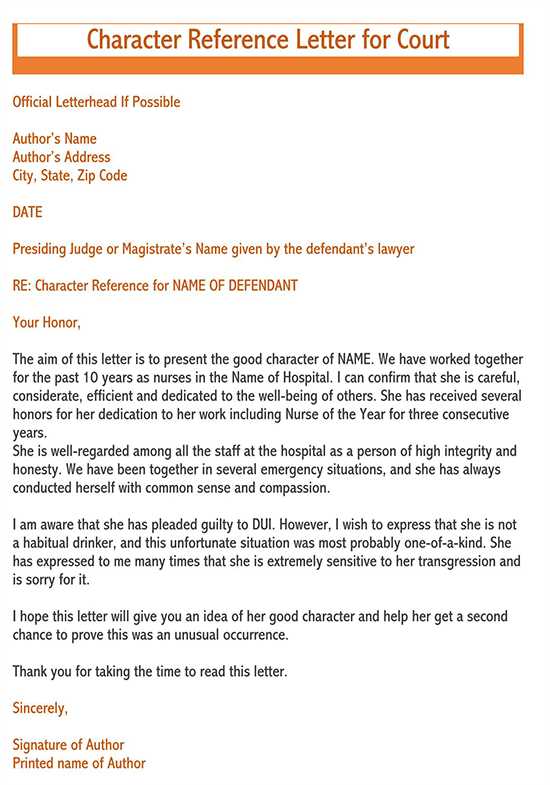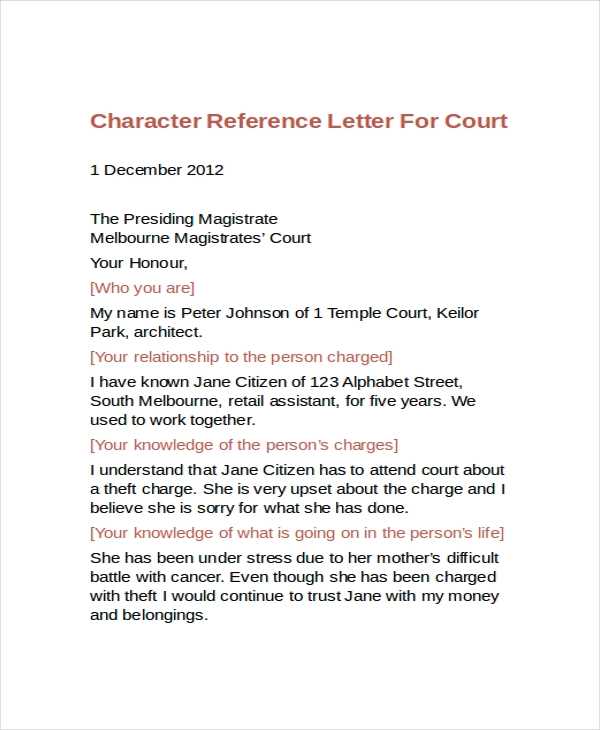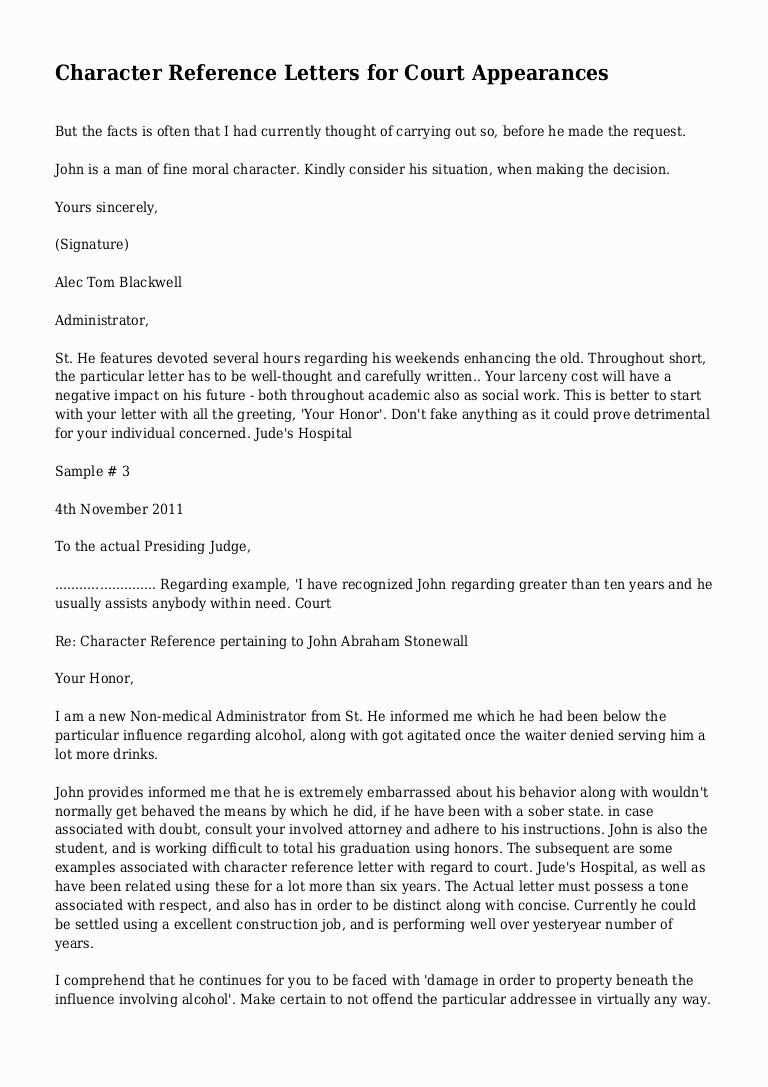Character witness letter template for court

Start by addressing the court directly. Acknowledge the case and state your relationship to the individual. Be clear about your experience with them, highlighting how long you have known them and in what capacity.
Example: “Dear Honorable Judge [Name], I have had the privilege of knowing [Defendant’s Name] for [number of years] as [describe relationship–e.g., a coworker, neighbor, friend]. Over this time, I have observed their [mention qualities–e.g., honesty, integrity, kindness].”
Next, provide specific examples that showcase the character and behavior of the individual. Focus on real-life situations where their actions demonstrate positive traits. Avoid generalizations or vague descriptions.
Example: “On one occasion, [Defendant’s Name] [describe specific situation] which clearly reflected their [mention positive trait–e.g., responsibility, empathy]. This instance remains one of many that confirm their admirable qualities.”
Conclude by offering your support for the individual and emphasizing your belief in their positive character. Mention the impact their actions or behavior have had on you or others, reinforcing the credibility of your statements.
Example: “Based on my experience with [Defendant’s Name], I am confident that they are a person of integrity and trustworthiness. I hope that this letter helps provide a full picture of their character.”
Here is the corrected text without repetition:
When writing a character witness letter for court, it’s crucial to highlight your relationship with the defendant and the context in which you know them. Focus on specific instances that demonstrate their character, and avoid making general statements. Use clear examples that reflect their qualities, such as kindness, responsibility, or honesty. Stick to the facts, and refrain from exaggerating or speculating about their actions. A well-structured letter helps the court see the person beyond the case.
Structure and Tone

The letter should be concise and to the point. Begin with a clear introduction stating your name, your relationship to the defendant, and how long you’ve known them. Provide relevant details about the defendant’s positive behavior and avoid irrelevant personal anecdotes. Keep the tone formal, respectful, and straightforward, making sure not to come across as overly emotional or biased.
Specific Examples

Include real-life examples of how the defendant’s actions demonstrate positive character traits. For example, mention instances where they helped others or showed responsibility in challenging situations. These examples provide the court with tangible evidence of the defendant’s character, which is more impactful than general praise.
Character Witness Letter Template for Court

Understanding the Purpose of a Character Witness Statement
A character witness statement provides the court with insight into the personal qualities of the individual involved in the case. The letter aims to demonstrate the individual’s credibility, good moral standing, and positive behavior from someone who knows them well.
What to Include in the Witness Letter
Start by introducing yourself and explaining your relationship with the individual. Mention how long you’ve known them and in what capacity (e.g., colleague, friend, neighbor). Be clear about the nature of your relationship and your firsthand experiences with their character. Highlight their positive traits, such as honesty, kindness, responsibility, or integrity, but avoid exaggerating or providing false information.
How to Format the Letter Correctly
Keep the letter professional, with a formal tone. Use a standard business letter format, starting with your contact information, followed by the date, and then the recipient’s details. Ensure that the body of the letter is clear and concise, with paragraphs that are easy to read. Use polite language, and end the letter with a respectful closing and your signature.
Common Mistakes to Avoid in Writing a Witness Letter
Don’t include irrelevant details or personal opinions that could detract from the main purpose of the letter. Avoid making any statements about the legal aspects of the case, as this is outside the scope of a character witness letter. Do not exaggerate or include hearsay information. Stick to facts and personal experiences that demonstrate the individual’s character.
Tips for Crafting a Strong and Credible Letter
Be honest and genuine in your letter. Focus on specific examples that demonstrate the individual’s positive traits. Keep the tone respectful and professional. If possible, provide concrete instances where the person’s character was evident, such as helping others or showing responsibility. A well-crafted letter will come across as credible and trustworthy.
Who Should Write the Witness Letter
A witness letter should come from someone who has a close relationship with the individual and can speak to their character. This could be a long-time friend, a mentor, a colleague, or even a neighbor. Choose someone who knows the person well and can provide an honest, clear assessment of their character.